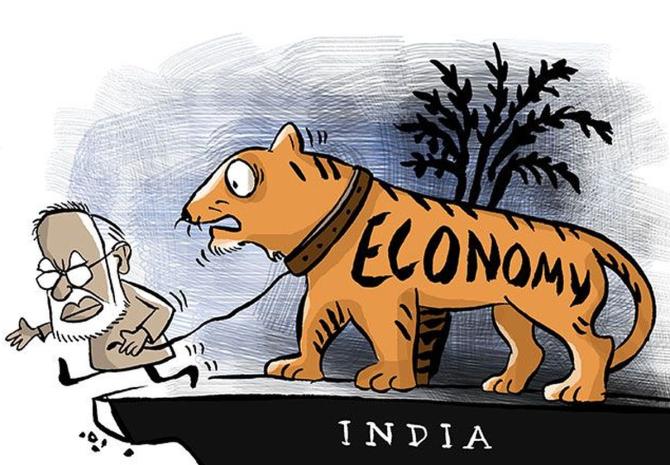By any economic theory or doctrine, this is no Budget that supports economic recovery, whether through supporting aggregate demand, or through expansionary stimulus, declares Rathin Roy.

I was hopeful, if somewhat perplexed, by the assertion in the Economic Survey that there was enough fiscal space to ramp up capital spending.
If true, this would mean that the government had found a way out of the ongoing fiscal crisis that I have been highlighting since 2019.
My analysis of the macro fiscal scenario in the 2022-2023 Budget, unfortunately, shows that the fiscal crisis continues to cripple the Centre's public finances.
Net tax revenues in FY22 (Rs 2.2 trillion) are higher than the budgeted target of 7.6 per cent of GDP, but this is expected to fall to 7.5 per cent in FY23.
This continues to be lower than the 8 per cent of THE GDP target that the government has been setting (and failing to achieve) since FY18.
Since the beginning of the growth slowdown, divestment receipts have been low despite the government repeatedly seeking to ramp up such receipts to mobilise resources for public expenditure.
In FY22, the government is Rs 1 trillion short of its target, and has in addition incurred capital expenditures to absorb some of Air India's liability.
So this government is consistently unable to either tax or divest in line with its own ambition ever since the growth slowdown commenced in FY17.
The fiscal crisis is now in its fourth year.
At best, one can say that the finance ministry has acknowledged its own incompetence at resource mobilisation and lowered its tax, non-tax and divestment targets accordingly.
But admission of incompetence by moderating FY23 revenue and divestment projections, and boasting about fiscal space in the Economic Survey do not serve to solve the nation's continuingly precarious fiscal situation.
I have been pointing out that total expenditure has been constrained in the pre-pandemic years.
In FY21, the government responded to the pandemic by increasing expenditure by 4.6 per cent of GDP, which was exactly equal to the increase in the fiscal deficit/GDP ratio.
In FY22, total expenditure has shrunk by a whopping 1.5 per cent of GDP.
The fiscal deficit has shrunk by 2.3 per cent of GDP in the same period.
Thus, the modest incremental revenues have been used to reduce the fiscal deficit, not to increase public expenditure to 'stimulate' the economy as so many pundits seem to be saying on television.
To see this, imagine if divestment receipts had been on target and had fully financed the increase in capital expenditure.

If this is not an expansionary Budget, then what is one to make of all the noise about increased capital expenditure?
It is certainly true that capital expenditure allocations have increased from 1.65 per cent of GDP in FY20 to 2.16 per cent in FY21 to 2.6 per cent in FY22 and projected to rise to 2.9 per cent in FY23.
This rise is consistent and means that less than 60 per cent of the fiscal deficit will be used to finance revenue expenditure in FY23 compared with 71.4 per cent in FY20.
This is a structural change in fiscal stance. But, contrary to the braggadocio in the Economic Survey, this has come about through revenue expenditure compression, and not through an increase in resource mobilisation, which is why the capital expenditure/GDP ratio has increased even though the total expenditure/GDP ratio has shrunk.
The quality of revenue expenditure is poor. Interest payments continue to rise inexorably.
Committed expenditure (the sum of establishment expenditure, goods and services tax cess, interest on debts and finance commission grants) has risen from 6.9 per cent of GDP in FY20 to 7.9 per cent in FY22.
The government continues to increase its subsidy allocation with food and fertiliser subsidies amounting to 1.2 per cent of GDP in FY23 compared with 0.93 per cent of GDP in FY19.
The Mahatma Gandhi National Rural Employment Guarantee Act outlays have shrunk dramatically from Rs 1.1 trillion in FY20 to Rs 73,000 crore in FY23 despite 7.1 million households being unable to access the programme on demand in FY22.
This is disgraceful for a government that has only this to show to alleviate the scarring caused by the Covid-induced economic collapse.
Equally disgraceful, National Health Mission allocations in FY22 were lower than in FY20.
The increase in public capital expenditure has, therefore, happened despite shrinking total expenditures by compressing revenue expenditure on public goods.
The government has seen fit to subsidise more but allocate less for much needed public employment.
By any economic theory or doctrine, this is no Budget that supports economic recovery, whether through supporting aggregate demand, or through expansionary stimulus.
In effect, all that it has done is substitute for the lowered private capital spending, despite the extraordinarily rise in profits that the few listed companies have enjoyed even as they have produced and sold less output over the course of the pandemic.
For the rest, the finance minister's speech continued with the unpleasant new tradition of keeping the discussion on the macro and fiscal framework as short as possible, listing a series of trivial announcements on custom duties, and other general irrelevances, and a strangely vague announcement on sovereign Green Bonds that was devoid of any discernible operational content.
I hope this is not yet another backdoor attempt by those in the government who seem to hanker after the privilege of being indebted to foreigners, to introduce foreign sovereign borrowing.
It is welcome that there are measures to ease the tyranny on personal tax payers, and some belated attempts to correct anomalies in corporate taxation.
But these things are handled by executive announcement, which, for some reason, take up huge space in India's one annual fiscal policy presentation.
It is unfortunate that since FY21, the government has had no forward looking medium-term macroeconomic framework or fiscal road map published with the Budget documents, which makes its claim that this Budget presented a 25-year blueprint all the more fatuous.
Empty rhetoric and noise may serve many posturing arms of government well, but the finance ministry has to deploy analysis and reasoned argument to restore its fiscal policymaking credibility that has been steadily eroding for some time now.
Rathin Roy is managing director, ODI, London. r.roy@odi.org. Views are personal
Feature Presentation: Rajesh Alva/Rediff.com












 © 2025
© 2025